A garland of Hindustani classical music
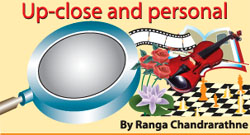 A
rare feat of performance and window into the world of classical music A
rare feat of performance and window into the world of classical music
Speaking on the present attitude of music, Dr. Thushara Ratnayake is
of the opinion that artistes conveniently forget the fact that one has
to master an area in order to be an authority. For instance, during his
studies in India, Thushara was not allowed to play any instruments other
than the violin in which he specialised. Dr. Thushara Ratnayake believes
that musicians or vocalists who outshine even in the field of popular
music, are those who have learnt their craft in a hard way.
|
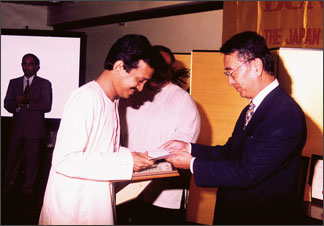
Receiving converted Bunka Award |
However, those veterans, as if they are hypocrites, do not divulge
the fact they have mastered an area of the subject and impart piecemeal
education to their students. Because of this, this system of education
produces mediocre artists.
Dr. Ratnayake further pointed out that this piecemeal education has,
in fact, diminished inborn talents of students who excelled at school
after two year's stay at the University. There are some students who
will not delve into the intricacies of the music, considering future
employment prospects and they eventually prepare for a vocation. He
states that the syllabus of the Music has been prepared by persons of
shallow understanding of the subject and tried to incorporate almost
every subject into music. For instance, subjects such as humanities,
comparative music, folk music, classical, percussion have been included
into the syllabus.
Although these subjects are important components, he is of the view,
that one should master one area before delving into other areas so that
the artistes have a thorough grasp of the subject. Until major reforms
are brought about in the areas of curricular formation with that vision
in focus, the present crisis in the teaching of aesthetic subjects will
further aggravate. The harsh truth is that person who outshone in the
university was an outsider.
|
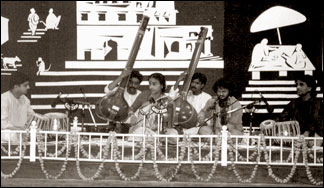
Dr.Thushara Ratnayake in a violin recital |
Dr. Thushara Ratnayake stated that he was rather disappointed about
the set up in the university on accounting of the unfriendly environment
and backstabbing. Speaking on the forthcoming show organised by his
students, Dr. Thushara Ratnayake stressed the fact that it had generated
a mix reaction from the staff.
Recollecting his student days in India, he studied under the guidance
of Prof. R. P. Shasthri in harsh climatic conditions with an unbearable
winter and equally scorching summer. Onset of the winter, people
evacuate from the province into other provinces, virtually bringing
Banaras to standstill. For the doctoral degree, students were asked to
select five categories out of 13 categories; Ragas in Kaunce, Kanada,
Danashri and Kamajanga categories. Students had to make forty
compositions based on selected Raga and to perform them. Composition
should reflect basic characteristics of the Raga in an aesthetically
satisfying manner (gath).
By the end of 1989, Dr.Thushara Ratnayake joined the University of
Visual and Performing Arts as a Lecturer. Though the students of the
University of Visual and Performing Arts welcomed him as they were eager
to learn from an expert teacher, it was rather a snobbish welcome he
received from the staff who perceived him as a potential threat to their
career prospects.
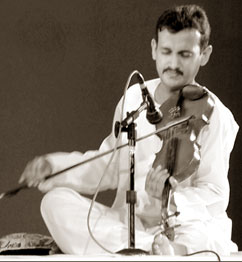 |
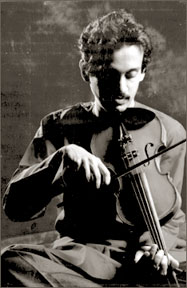 |
| |
Classical violinist paints
his pictures on silence. |
Describing the under cutting and backstabbing in the field,
Dr.Thushara Ratnayake stated that even interview procedures have been
tampered with , in order to recruit the person that the group wanted to
and that the university staff is infected with professional gangsterism
that prevents talented person entering the academic staff.
Speaking on the present status of classical music in Sri Lanka, Dr.
Thushara Ratnayake stated that each and every one could not appreciate
classical music and one has to have either an understanding of classical
music or has to learn to appreciate it. Unless classical music is taught
in the proper manner, it is not possible to raise the standard of
classical music. Light music is for the ordinary citizens who have
little understanding of the music. General perception of music is that
the song is the supreme product music. However, in fact, a song is the
entry point for ordinary citizens into the deep seas of music.
One, who has steeped in the tradition of classical music, cannot
appreciate any zest in light music. He is of the view that one should
not perform classical music if he or she does not learn it properly.
Playing classical music on a national day of mourning, ill-performance
of classical music and none availability of space in mass media such as
television and radio for classical music has also contributed to the
present status of classical music in Sri Lanka. This has resulted in
gross ignorance of classical music. A little space in media for
classical music has also been occupied by those who have shifted to
light music though they have mastered classical music at early stage of
their careers.
On tutored voices, Dr. Thushara Ratnayake is of the view that
perfection of notes in a vocalist who has trained in classical music is
distinguishable from an untutored voice. This is applicable to
performers. For instance, Bishmiallah Khan's performance is considered
peerless and unique.
One insignificant event would have a profound influence in one's
life, sometimes, almost changing the course of life. It may not be
applicable to each and every one of us but certainly for Dr.Thushara
Ratnayake who stumbled upon the violin that is to occupy the rest of his
life.
As a child of eleven years, he (Dr. Ratnayake) asked for a guitar in
a showcase as the New Year prize. It was a customary that a child
received a prize for the Sinhala New Year. Thushara's father who worked
at the Sri Lanka Broadcasting Corporation (SLBC) took him to the studios
so that he could listen to the voice recording of Maestro W. D.
Ameradeva. Following the recording young Thushara was asked to select an
instrument from the orchestra. Consulting his memories of the instrument
he saw in the showcase, young Thushara selected the violin which was
somewhat similar to the guitar in shape.
Subsequently Dr. Thushara Ratnayake commenced his formal studies
under the tutelage of Visharadha Somasiri Ilesinghe who was his father's
friend, on January 13, 1978.
At the time, Thushara Ratnayaka was schooling at Ashoka Junior School
which is now Ashoka College. Although he engaged in extensive practice
of the violin at home, Thushara Ratnayake did not come into the lime
light until he presented a classical violin recital, for the first time,
in a programme aired over SLBC in 1983. However, he was better known for
his talents among his friends following a television programme.
Though he passed the Advanced Level examination and was duly selected
for the University of Colombo in 1987, prevalent situation compelled him
to pursue his dream of studying music in India. In 1989, he joined the
Banaras Hindu University.
Having extensively practised violin and studied up to Visharadha
examination in Sri Lanka (at the age of 20), Dr. Thushara Ratnayake had
the ideal background to excel in his studies at the university.
One of the salient characteristic of his phenomenal student life is
that he had always recorded First division at his examinations. At the
Benares Hindu University Thushara Ratnayake read for the Bachelor of
Music (Honours) degree at the Department of Instrumental Music in the
Faculty of Performing Arts. Dr. Thushara Ratnayake specialised in
violin.
For Thushara violin is a vehicle to express his spirit out in terms
of notes. As he is well versed in both North and South Indian classical
music traditions, his performance is marked for its delicate admixture
of traditions. He exploits the intrinsic properties of notes within few
seconds, a characteristic of a highly talented player.
After a
decade of silence....
A classical Violin Concert
by Dr. Thushara Ratnayake will be held on March 26, 2008 at
the Ananda College hall. The concert consists of a
violin-flute duet and violin-guitar duet. The concert
commences with playing of the Rag Jog which will be followed
by semi-classical performance.
The Raga Mala is an item
which Dr. Thushara Ratnayake will play with his students. In
this performance different characteristics of raga and
features and change of tones are depicted. For instance, how
Rag Bahar differs from Miyamalhar and shifting from one raga
to another is also manifested. In addition the Ragas that
link with Bahar raga such as Adana Bahar, Malkaune Bahar,
Kedar Bahar, Hindol Bahar, Hameer Bahar.
Techniques such as change
of moods of Ragas and code (Sangathi) will also be
demonstrated. In addition creation of Ragas from the
composition of different features (Anga) in Raga such as
Kanhada, Kaunse is also played. Dr. Thushara Ratnayake is of
the view that the performance will be of educational value
to the students. |
|
